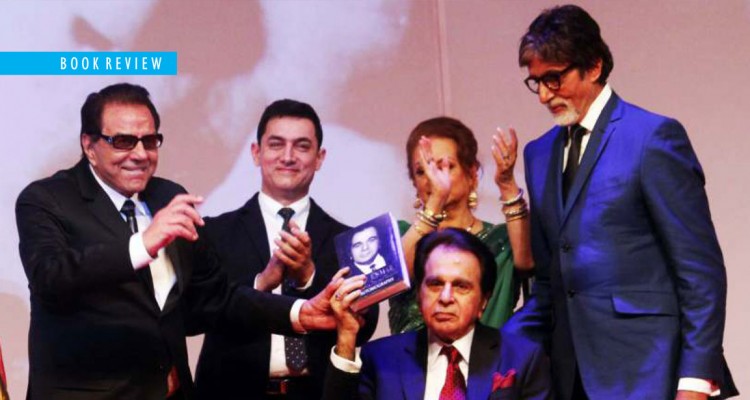Amit Ranjan flips through the pages of the autobiography of one of Indian cinema’s most magnetic personality
On 9 December 2013, during my visit to Pakistan, I met Saeed Ahmed, author of Dilip Kumar: Ahadnama-E- Mohabbat, at his Model Town residence in Lahore. He informed me that in Pakistan a few individuals gather every year on 11 December at Dilip Kumar’s ancestral home in Peshawar to celebrate his birthday. As a Dilip Kumar fan himself, Saeed Ahmed is part of the group. Unfortunately, that year, due to fever and cough, he was unable to go to Peshawar. He was sad about missing the annual ritual.
The anecdote reflects the respect Dilip Kumar commands beyond the borders of India.
In Bollywood, many actors from succeeding generations have tried to imitate Dilip Kumar but none is his true successor, athough some of them have achieved stardom.
On Dilip Kumar’s screen role In his book Nehru’s Hero: Dilip Kumar in the Life of India, Lord Meghnand Desai portrays him as a Nehruvian hero for playing characters who believe in the political agenda of India’s first Prime Minister Pandit Jawahar Lal Nehru.
Those characters played by Dilip Kumar were an attempt to understand and to share with a larger audience values needed to confront existing social problems in the early decades of post-independent India.
In his second innings, Dilip Kumar chose to play different roles on screen according to changing times.
In Shakti and Karma he is a honest police officer fighting criminals and trying to implement the rule of law. In Mashal he is a honest journalist who is against social ills like corruption. In both the phases of his career, his acting is engrossing. He is perfect in enacting his on screen characters in Ganga Jamuna, Naya Daur and Gopi, making audiences believe that he is either from Uttar Pradesh or Bihar.
Peshawar
In this autobiography, narrated by Dilip Kumar and written by Udaytara Nayar, the story starts with Kissa Khawani Bazaar, a neighbourhood in Peshawar famous for story telling and story listening. Here Dilip Kumar was born as Yusuf Khan.
The city is blessed with pristine natural beauty as well. After achieving stardom, Dilip Kumar visited Peshawar in 1988 to inaugurate the first blood bank in that city. Using that opportunity, General Zia-ul- Haq’s military government welcomed him as a state guest and in 1998 the government of Pakistan conferred him with the highest civilian award Nishan-e-Imtiaz. Unfortunately, Peshawar and the entire Khyber Pakhtunkhwa is used as a base now by radicals and militants.
Dilip Kumar became an actor by accident. In this autobiography, he comes across as a family man who supported his siblings to achieve their goals. Some of his relatives tried and failed in life while others annoyed him by the decisions they made. But he was there for everyone. Not only relatives but Dilip Kumar also helped many individuals struggling to make a living in Bollywood.
Yesteryear actress Mumtaz quoted as being grateful to Dilip Kumar for accepting to act with her in Ram aur Shyam after which her career took a major leap forward. Many an actor no where near the stature of Dilip Kumar had refused to work with Mumtaz before.
Madhubala
For the first time Dilip Kumar reveals why he could not marry Madhubala. Contrary to popular notion, Madhubala’s father, Ataullah Khan, was not opposed to her marrying him. He had his own production company and he was only too glad to have two stars under the same roof. It wa Ataullah Khan’s business intentions that made Dilip Kumar break his relationship with Madhubala for not trying hard enough to dissuade her father from interfering in her life. Although they worked together in K. Asif’s blockbuster Mughal-e- Azam, it was over for him.
Dilip Kumar also talks about his marriage to Saira Banu, who is half of his age and his short-lived second marriage with Asma Rehman.
Back to his career, Dilip Kumar talks about his encounter with Devika Rani, who gave him his screen name. He talks of his films and colleagues like Ashok Kumar, S. Mukherjee and Nargis all of whom enjoyed a great rapport with him. Dilip Kumar has also talked about his non-Bollywood friends and has shared various anecdotes with the reader. He says that he always took on a film once the character he was asked to portray interested him and not for money.
That could be one reason that makes Dilip Kumar an ever green legend in his own lifetime.
Dilip Kumar: The Substance and the Shadow pubished by Hay House India, 2014
The author is a Delhi based researcher and scholar

